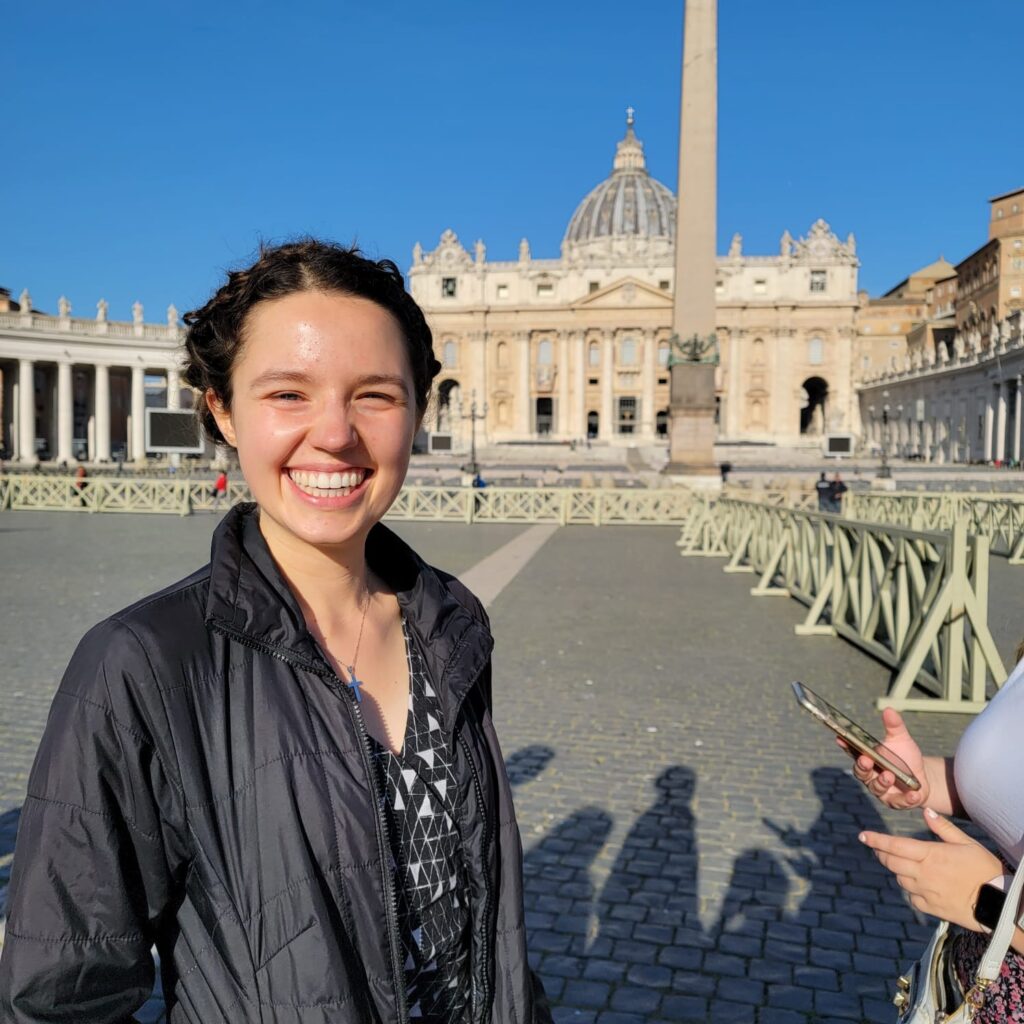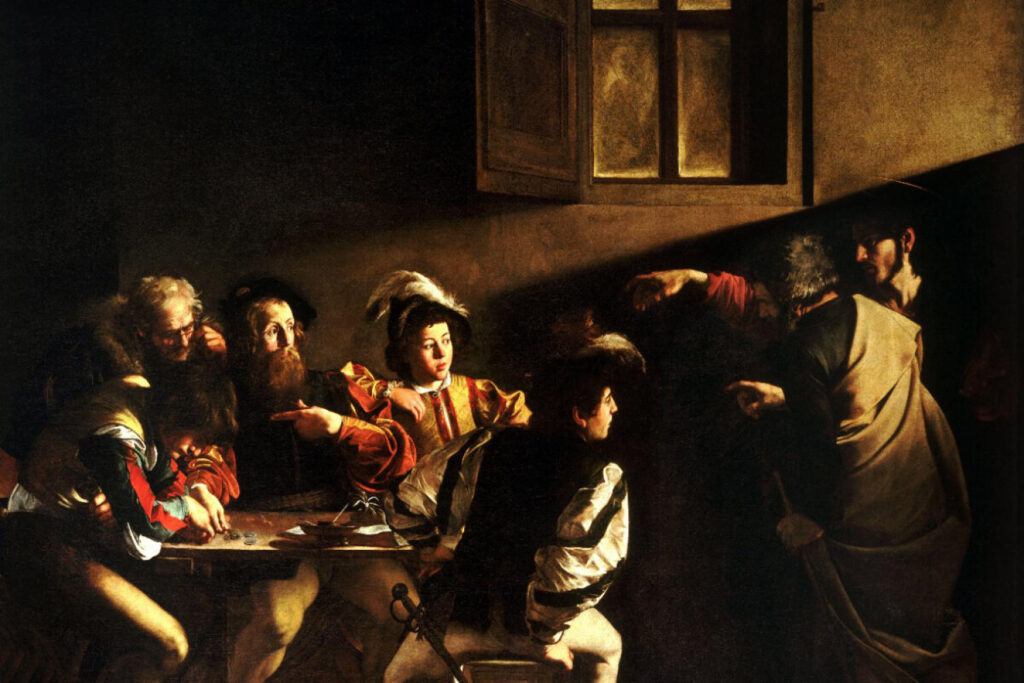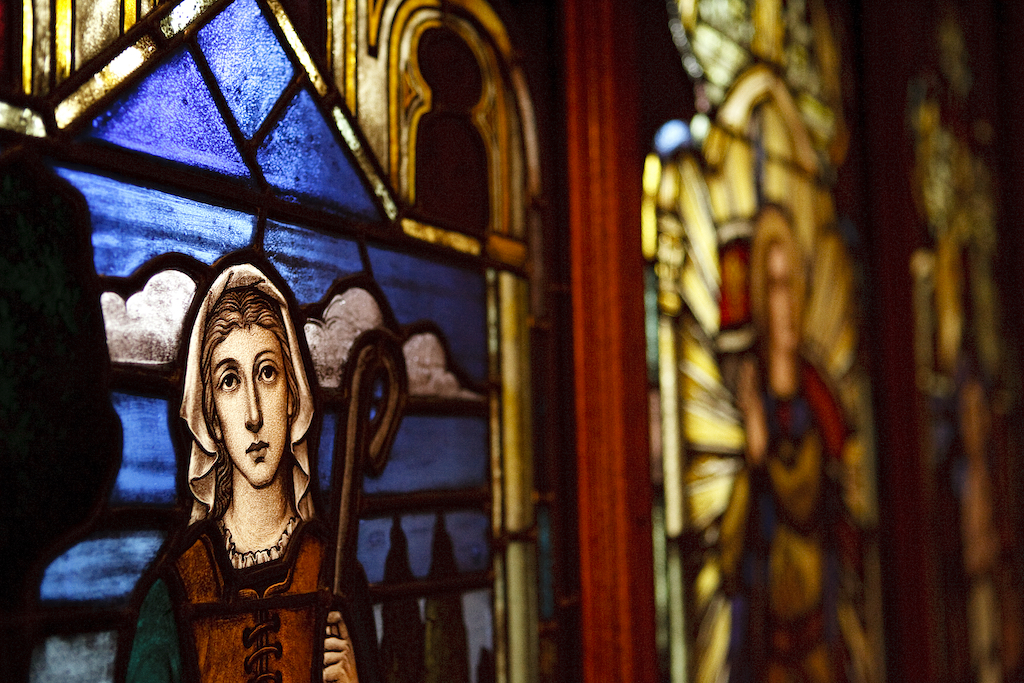When Catholic Studies began 30 years ago, it did not start with a blueprint, strategic plan, or well-developed curriculum. Rather, it was formed within a community of faculty whose commitment and desire to strengthen and renew Catholic higher education was guided by the virtue of faith in relation to key intellectual convictions in Catholic education.
This faith is rooted in the extraordinary claim that the “Word became Flesh,” and that the Incarnation impacted everything in education – humanities, arts, sciences, social sciences, the professions – and the overall life of the university.
Inspired and led by Dr. Don Briel and supported by a small network of faculty from a variety of disciplines, the plans for Catholic Studies were modest. In fact, it was simply an interdisciplinary program with no formal home on campus. We assumed that most students would pursue a minor rather than a major, and we did not expect large numbers to show interest. The results quickly outpaced our expectations. What started as a trickle of students grew to a steady stream to become one of the largest humanities majors on campus.
Catholic Studies has gone forward under a set of guiding principles rather than a specific formula.”
Catholic Studies at St. Thomas is the first, the largest, and the most defining program of its kind in the world. More than 1,600 alumni bring the Gospel to their corners of the world: 160 are priests, 65 are religious, and hundreds more are spouses, parents, teachers, business leaders, engineers, lawyers, doctors, nurses, and entrepreneurs.
With a regional, national, and international impact, Catholic Studies has amplified the Catholic intellectual and spiritual life of St. Thomas specifically and Catholic higher education more broadly.
With more than 60 Catholic Studies programs across the country today, Catholic Studies at St. Thomas is viewed as the “gold standard” in innovation and vitality. Our humble beginnings nurtured undergraduate and graduate degrees, highly regarded institutes, an academic journal, outreach to the Latino community, a leadership intern program, educational internships and fellowships, and other activities and programs that display a distinctly Catholic character.
Catholic Studies has gone forward under a set of guiding principles rather than a specific formula. To rightly understand this initiative, it would not be too much to say this movement in Catholic higher education demands not only an understanding of its various forms and expressions, but also and more importantly, a grasp of the underlying principles that inform its work within university education. While there are different ways to describe these principles, I find the distinction made by St. John Henry Newman, the great 19th century educationalist, between the university and collegiate principles, the most comprehensive.
An Education in Seeing Things Whole
The university principle expresses the essence of education. It concerns the acquisition of knowledge in the classroom, the lab, and the library where the mind is cultivated and sharpened, disciplined and made more precise, active, and penetrating. At the heart of the university principle is the aim of developing a habit of mind that sees things in relation to each other, resulting in a comprehensive vision that allows wise and accurate judgments about the world.
In Catholic Studies, we focus on the intellectual habit of seeing things whole, a quality of mind
that is increasingly deficient in higher education. The strength of the modern university is technical specialization, but this strength also feeds into the university’s most significant weakness. With the growing specialization of subjects, students find it increasingly difficult to gain an integrated vision across the various disciplines.

This malaise was articulated by St. John Paul II in his 1990 Apostolic Letter, Ex Corde Ecclesiae, where he wrote about the “rigid compartmentalization of knowledge within individual academic disciplines” (§16). Such compartmentalization not only fragments knowledge; it also fragments the mind of the student.
As we sought to address these challenges, we were guided by two intellectual convictions that inform the university principle and express the interdisciplinary character of Catholic Studies.
Catholic Studies is not a bubble; nor is it a fortress or an enclave. It is an intellectual initiative that seeks to establish appropriate relationships with and among all the disciplines.”
The first conviction is the unity of knowledge. At the core of this conviction is the confidence that the world is not a chaos but rather a cosmos. Because the world is created by a God of order, it contains patterns of intelligibility that can be discovered. Albert Einstein captured this conviction when he said, “The most incomprehensible thing about the universe is that it is comprehensible.”
Einstein’s claim concerning the comprehensibility of the universe is what makes a university a place where the unity of knowledge can be discerned and discovered. As Dr. John Boyle tells his students: “Everything from God to dirt is ordered and related in significant and intelligible ways.”
As Catholic universities grew in complexity, we saw a need to foster an interdisciplinary center and eventually a department whose unique task would be to articulate such connections among the disciplines, not just for the humanities but also for the sciences and professions. Catholic Studies is not a bubble; nor is it a fortress or an enclave. It is an intellectual initiative that seeks to establish appropriate relationships with and among all disciplines.
The second key conviction that guides our work is the complementarity of faith and reason. Grasping the entirety of truth demands two modes of knowledge that are distinct but related: truths achieved through reason and truths received through Revelation. These two modes of knowing reflect the dynamism between the active and contemplative life and work together in complementary fashion. Faith prevents reason from being reduced to its instrumental tendencies; it connects reason to metaphysical questions and to matters of value, purpose, meaning, and ultimacy. Reason enriches faith by protecting it from the excesses of fideism, sentimentality and superstition.
A key for understanding the complementarity of faith and reason is the Greek concept of logos. We translate logos as “word,” but in Greek it also means “reason.” Logos for the Greeks was a power that enabled the human mind to perceive the order present in the universe. This logos, this latent potency of mind, is used in our description of many of our disciplines: biology, geology, sociology, psychology, anthropology. These are human disciplines, forms of reason, expressions of logos, that help us to see patterns of intelligibility in the world.
But the Greek understanding of logos does not end the matter. The prologue of John’s Gospel identifies Jesus as the Logos, the divine and creative reason. This is a truth grasped by faith – not a feeling but an intellectual illumination – resulting in a habit of mind by which eternal life is seen to begin in us, as St. Thomas Aquinas tells us, and the mind learns to see the end in our beginnings, and to penetrate to the invisible essence in the visible object.
Faith, as St. Anselm once stated, seeks understanding, looks for reason. Catholic Studies, through its courses on Catholicism and science, faith and business, literature, the mission of the engineer, faith and doubt, as well as in its publications, seminars and conferences on campus and throughout the world, promotes the dialogue between the divine Logos and the human logos in the humanities, sciences, social sciences, and professions. This intersection of faith and reason is where we discover the deepest wisdom for living. For the incarnate Logos is the highest expression of order and intelligibility, the privileged place where truth meets love.

The university was originally an outgrowth of the Catholic mind founded to allow the complementarity of faith and reason to find expression in fruitful dialogue. Yet this crucial principle can easily get lost or muted in the modern university. Universities are critiqued for reducing their purpose either to utilitarian careerism or to ideological activism.
The formation of THE Heart and Souls
Whereas the university principle is the essence of higher education, the collegiate principle provides for the university’s integrity. The life of a student is never confined simply to the classroom, lab and library. Students live, play sports, and worship and pray together; they participate in clubs and internships; and above all, they create friendships. They are called not only to gain an intellectual habit of seeing things whole, but also fashion lives of integrity.
This intersection of faith and reason is where we discover the deepest wisdom for living.”
As every parent who sends a child to college knows, roommates, friendships, and the student community have serious implications for their child’s moral and spiritual health. In addition
to developing intellectual virtues, students need to grow in moral and religious virtues as well. Without such virtue, the intellectual virtues are prone to weaken, leaving the student vulnerable and likely to capitulate to one of the most dangerous temptations of the academy: intellectual pride.
This collegiate principle, as a formation of the soul and heart, has informed our work at Catholic Studies. We create conditions, opportunities, and programs through which the spiritual and moral lives of students are integrated with their intellectual work.
This principle is particularly expressed in our front room in Sitzmann Hall.

There hangs the painting by the Renaissance artist Caravaggio, “The Calling of Saint Matthew.” It depicts the moment when Christ is calling Matthew to follow him. In one form or another it is a call that comes to each of us. College years are of crucial importance for attentiveness to this call. Students are discerning their majors, assessing their gifts and talents, and looking toward the profession they hope to pursue. It is also a time for every serious Catholic student to look at the three main states of life: lay, religious and priestly. To facilitate such discernment, we collaborate with Campus Ministry where Masses, adoration, retreats, and spiritual direction are offered.
These decisions of vocation, profession, and marriage need to be planted in the deepest soil of wisdom possible. This is why we see Catholic Studies as more than an academic project; it is also an ecclesial one. We aim to help our students embed their moral and spiritual lives in the life of the Church – her prayer, sacraments, and teachings. Apart from this ecclesial context, the intellectual work of the university will go awry, and the education that was meant to bring a young mind and spirit into the order of the Logos instead will tend to corrupt and misshape it.
This is why Newman maintained that “practically speaking, the university cannot fulfill its object duly without the Church’s assistance, i.e., the Church is necessary for its integrity ... the Church steadies it in the performance of that office,” a truth as relevant today as it was in Newman’s time.
This story is featured in the summer 2023 issue of Lumen.







